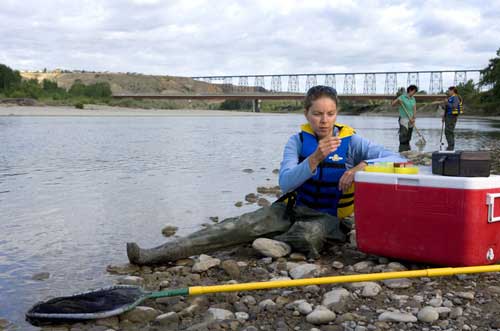The infrastructure is in place, the expertise is on campus and the precedent has been set – so it is hardly surprising that the University of Lethbridge is formalizing its established reputation as a leader in water research with the creation of the Water Institute for Sustainable Environments (WISE).
If the WISE acronym sounds familiar, that's because it is, used from 2002-2006 when it represented the Water Institute for Semi-Arid Ecosystems. Its then-mandate, led by then-Vice-President (Research), Dennis Fitzpatrick, was to expand partnerships with regional, federal and provincial government agencies and elevate the regional, provincial and national profile of the University relative to water research.

It built off the 1988-2004 Water Resources Institute (WRI) that first emphasized water management studies as related to irrigation and more formally established interaction between the University and regional water management agencies. When added to the Alberta Ingenuity Centre for Water Research (AICWR, a 2003-2009 initiative funded by Alberta Ingenuity) and the construction of the Alberta Water and Environmental Science Building (AWESB) in 2008, it serves as prelude to today's WISE incarnation.
"The combination of the recruitment of many faculty with interests in water research, the completion of previous initiatives such as WRI and AICWR, and the implementation of the AWESB, provides a foundation for the next step towards the advancement of the University of Lethbridge as a national centre for water research and training," says Vice-President (Research), Dr. Dan Weeks. "The establishment of this institute is that step."
Today's WISE, which was officially approved by the Board of Governors at its most recent meeting, reflects how the University has grown in terms of its profile as a leader in water research and the comprehensive nature by which it approaches water related topics.
Weeks says the WISE acronym was maintained because of its history with the University, but updated to reflect the greater scope the U of L is now prepared to tackle. The word 'sustainable' was added to emphasize conservation and stewardship and to reflect expanding research activities that will not be limited to regional or semi-arid environments. Likewise, 'environments' replaces 'ecosystems' because it suggests a broader context of study.
"WISE will strive to facilitate activities but will not act to limit or screen activities by individuals or groups of University faculty," says Weeks. "It will be especially effective in encouraging collaborative and interdisciplinary research initiatives that involve groups of faculty and students from across the University."
In that respect, Weeks sees the institute as being an excellent recruitment tool, particularly of graduate and post-doctoral students.
"It will provide a major opportunity to blend teaching and research activities and further establish our emergence as a comprehensive university," he says.
As the University of Lethbridge has continually expanded its commitment to water research and broadened its reputation as a hub of expertise in water management strategies, the establishment of WISE is seen as a natural evolution.
"By formalizing WISE, it sets the University on course to further stake its claim as the national centre for water research and training," says Weeks.
This story first appeared in the Legend. For a look at the Legend in a flipbook format, follow this link.
